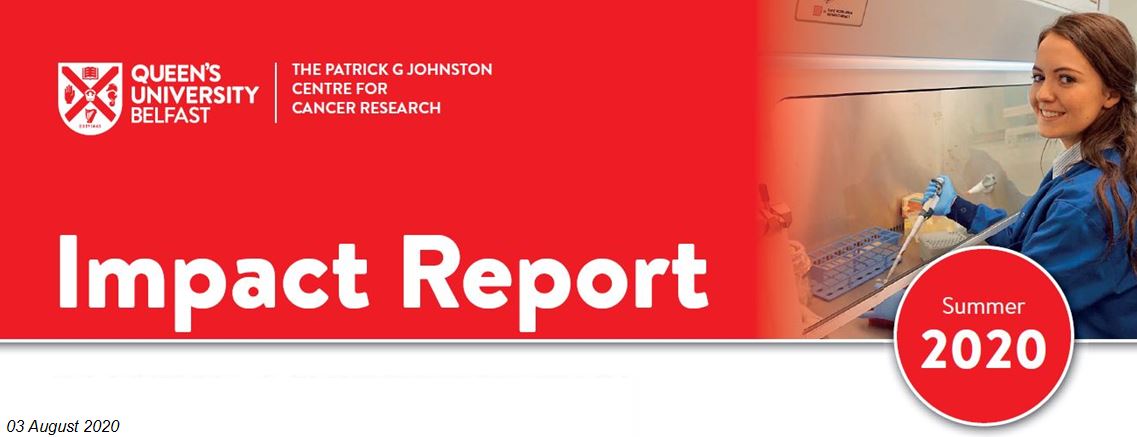IMPACT REPORT HIGHLIGHTS ROLE AND IMPORTANCE OF PHILANTHROPY FOR CANCER RESEARCH AT QUEEN'S 
The summer 2020 edition of the Impact Report highlighting the work of The Patrick G Johnston Centre for Cancer Research at Queen's – and the importance of philanthropic support – has just been published and distributed to the University’s benefactors.
Much of the work of the Centre has been made possible by the generosity of individual donors and organisations which enables the University to help fund local cancer research, staff, equipment and clinical research trials which in turn changes lives here in Northern Ireland.
The current issue highlights how a BBQ raised a staggering £60,000 gift for breast cancer research; how a local doctor – who graduated in 1979 – is providing medical students with scholarships; and how an alumnus made global bowel cancer research possible with a travel fund.
In addition, the Report outlines how the University has honoured its late Vice-Chancellor, Professor Patrick G Johnston, plus there is a round-up from the Centre’s clinical academics outlining how they are progressing in their respective cancer research fields.
Other stories featured include:
- How 20 members of the Perennials RFC raised £15,000 for ovarian cancer research by cycling in the Giro d’Italia Gran Fondo NI
- An insight into the work of clinical academics Professor Joe O’Sullivan, Professor Mary Frances McMullin and Dr Niamh Buckley
- The impact of philanthropy on cancer research
- Plus an introduction to the Health Fundraising team at Queen’s
Addressing the impact of COVID-19 on cancer research in her accompanying letter to donors and supporters, Nathalie Trott, Director of Development and Alumni Relations, said: “Since this edition went to print we are all now living in very strange times and we can’t avoid the impact that COVID-19 has had on cancer services here in Northern Ireland and beyond.
“These effects include delays in urgent referrals and patients having their cancer treatment, such as chemotherapy, postponed or surgery being delayed.
Referring to the role of Professor Mark Lawler, Associate Pro Vice-Chancellor and Professor of Digital Health at Queen’s, in the Special Network on the impact of COVID-19 on cancer, recently established by the European Cancer Organisation, Nathalie added:
“His role exemplifies how researchers at Queen’s are key global leaders, helping to chart a path through the COVID-19 pandemic to ensure the best healthcare for people with cancer, how to undo the current damage from COVID-19, and also create a more resilient future.
“Thanks to donor support, we can continue to develop the best scientific minds here in Northern Ireland by investing in education, training and research.”
With cancer researchers and support staff slowly beginning to return to campus where it is safe to do so, laboratories have started to reopen – with strict adherence to the COVID-19 guidelines governing the numbers of staff permitted, cleaning of work areas and one way systems throughout the buildings.
“Our researchers are delighted to be able to get back to their life-changing work,” continued Nathalie. “We hope the progress towards normality continues and that our own Development and Alumni Relations Office team can also return to the office and our more usual fundraising activities.”
Teresa Sloan, Head of Health Fundraising at the University added: “After reading our latest Impact Report donors should feel very proud of their own personal impact, and that of the local community, on global cancer research right here in Belfast.
“Anyone who can help this important work – particularly at the present time – in any way, large or small, is most welcome to get in contact."
Teresa concluded: “We love to hear from our supporters and hope that this latest Impact Report inspires them – and others – to help the University to save lives both now and in the future. There has never been a more crucial time to get behind our world-class researchers and to support cancer research here at Queen’s.”
To support health-related research projects at Queen’s, visit the Development and Alumni Relations Office website or contact Teresa Sloan, Head of Health Fundraising.
For general enquiries about this story, or to submit a graduate news item, please contact Gerry Power, Communications Officer, Development and Alumni Relations Office, Queen’s University Belfast.
Back to Main News
Top of Page